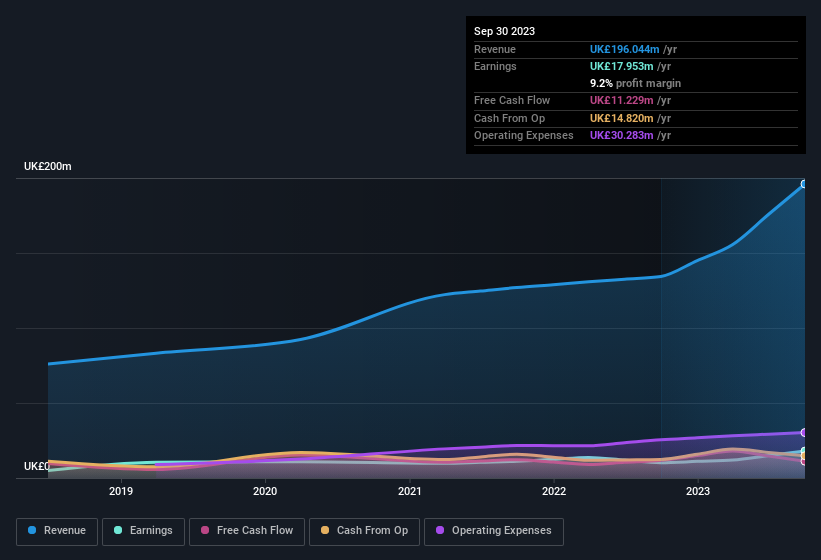We Ran A Stock Scan For Earnings Growth And Supreme (LON:SUP) Passed With Ease
Investors are often guided by the idea of discovering 'the next big thing', even if that means buying 'story stocks' without any revenue, let alone profit. Unfortunately, these high risk investments often have little probability of ever paying off, and many investors pay a price to learn their lesson. Loss making companies can act like a sponge for capital - so investors should be cautious that they're not throwing good money after bad.
Despite being in the age of tech-stock blue-sky investing, many investors still adopt a more traditional strategy; buying shares in profitable companies like Supreme (LON:SUP). Even if this company is fairly valued by the market, investors would agree that generating consistent profits will continue to provide Supreme with the means to add long-term value to shareholders.
Check out our latest analysis for Supreme
Supreme's Earnings Per Share Are Growing
Generally, companies experiencing growth in earnings per share (EPS) should see similar trends in share price. So it makes sense that experienced investors pay close attention to company EPS when undertaking investment research. Impressively, Supreme has grown EPS by 18% per year, compound, in the last three years. If the company can sustain that sort of growth, we'd expect shareholders to come away satisfied.
One way to double-check a company's growth is to look at how its revenue, and earnings before interest and tax (EBIT) margins are changing. Supreme maintained stable EBIT margins over the last year, all while growing revenue 46% to UK£196m. That's a real positive.
You can take a look at the company's revenue and earnings growth trend, in the chart below. For finer detail, click on the image.
While we live in the present moment, there's little doubt that the future matters most in the investment decision process. So why not check this interactive chart depicting future EPS estimates, for Supreme?
Are Supreme Insiders Aligned With All Shareholders?
Investors are always searching for a vote of confidence in the companies they hold and insider buying is one of the key indicators for optimism on the market. This view is based on the possibility that stock purchases signal bullishness on behalf of the buyer. However, insiders are sometimes wrong, and we don't know the exact thinking behind their acquisitions.
Any way you look at it Supreme shareholders can gain quiet confidence from the fact that insiders shelled out UK£506k to buy stock, over the last year. This, combined with the lack of sales from insiders, should be a great signal for shareholders in what's to come. Zooming in, we can see that the biggest insider purchase was by CEO & Director Sandeep Chadha for UK£485k worth of shares, at about UK£1.28 per share.
On top of the insider buying, it's good to see that Supreme insiders have a valuable investment in the business. With a whopping UK£55m worth of shares as a group, insiders have plenty riding on the company's success. Amounting to 34% of the outstanding shares, indicating that insiders are also significantly impacted by the decisions they make on the behalf of the business.
While insiders already own a significant amount of shares, and they have been buying more, the good news for ordinary shareholders does not stop there. The cherry on top is that the CEO, Sandy Chadha is paid comparatively modestly to CEOs at similar sized companies. For companies with market capitalisations between UK£80m and UK£320m, like Supreme, the median CEO pay is around UK£616k.
Supreme's CEO took home a total compensation package of UK£232k in the year prior to March 2023. That looks like a modest pay packet, and may hint at a certain respect for the interests of shareholders. CEO compensation is hardly the most important aspect of a company to consider, but when it's reasonable, that gives a little more confidence that leadership are looking out for shareholder interests. It can also be a sign of good governance, more generally.
Is Supreme Worth Keeping An Eye On?
For growth investors, Supreme's raw rate of earnings growth is a beacon in the night. On top of that, insiders own a significant stake in the company and have been buying more shares. Astute investors will want to keep this stock on watch. Even so, be aware that Supreme is showing 1 warning sign in our investment analysis , you should know about...
There are plenty of other companies that have insiders buying up shares. So if you like the sound of Supreme, you'll probably love this curated collection of companies in GB that have witnessed growth alongside insider buying in the last three months.
Please note the insider transactions discussed in this article refer to reportable transactions in the relevant jurisdiction.
Have feedback on this article? Concerned about the content? Get in touch with us directly. Alternatively, email editorial-team (at) simplywallst.com.
This article by Simply Wall St is general in nature. We provide commentary based on historical data and analyst forecasts only using an unbiased methodology and our articles are not intended to be financial advice. It does not constitute a recommendation to buy or sell any stock, and does not take account of your objectives, or your financial situation. We aim to bring you long-term focused analysis driven by fundamental data. Note that our analysis may not factor in the latest price-sensitive company announcements or qualitative material. Simply Wall St has no position in any stocks mentioned.

 Yahoo Finance
Yahoo Finance 
